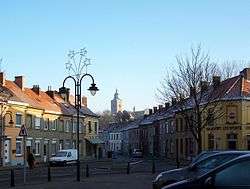Braine-l'Alleud
| Braine-l'Alleud Eigenbrakel (Dutch) | |||
|---|---|---|---|
| Municipality | |||
 | |||
| |||
 Braine-l'Alleud Location in Belgium | |||
|
The municipality of Braine-l'Alleud in Walloon Brabant  | |||
| Coordinates: 50°41′N 04°22′E / 50.683°N 4.367°ECoordinates: 50°41′N 04°22′E / 50.683°N 4.367°E | |||
| Country | Belgium | ||
| Community | French Community | ||
| Region | Wallonia | ||
| Province | Walloon Brabant | ||
| Arrondissement | Nivelles | ||
| Government | |||
| • Mayor | Vincent Scourneau (MR-IC) | ||
| • Governing party/ies | MR-IC, PS | ||
| Area | |||
| • Total | 52.12 km2 (20.12 sq mi) | ||
| Population (1 January 2013)[1] | |||
| • Total | 38,882 | ||
| • Density | 750/km2 (1,900/sq mi) | ||
| Postal codes | 1420, 1421, 1428 | ||
| Area codes | 02 | ||
| Website | www.braine-lalleud.be | ||
Braine-l'Alleud (Dutch: Eigenbrakel) is a Walloon municipality in the Belgian province of Walloon Brabant, about 20 kilometers south of Brussels. The Braine-l'Alleud municipality includes the former municipalities of Braine-l'Alleud proper, Ophain-Bois-Seigneur-Isaac, and Lillois-Witterzée. It also includes the hamlet of Sart-Moulin, the inverted name of which inspired Hergé’s Moulinsart castle. The famous Lion of Waterloo where the eponymous battle took place is in the territory of Braine-l'Alleud. Bordering Flanders, the town is home to a minority of Dutch-speakers.
History
Middle Ages
Several archaeological finds point to prehistoric settlements in this area. The first historical mention of a parish on Braine-l'Alleud's current territory, then called Dudinsart, dates from 1131, date at which Godfrey I, Duke of Brabant ceded it to the Abbey of Gembloux. The Duke, however, still owned exempt land (or franchise) on this territory, as specified in a legal document by Henry I dated 1197. The name of the municipality changed to the current one, derived from “Braine”, former name of the stream that crosses its territory (now called the “Hain”), and “alleu”, a medieval French word designating exempt land. The latter name was added to the former to distinguish this community from two neighbouring ones also called Braine.
At the beginning, the franchise might not have been much more than a right to local administration. By 1489, however, the local lord enjoyed complete juridical power on its territory, which was still formally part of the fiefdom obtained from the Duke of Brabant.
Battle of Waterloo
In 1815, part of the fighting that took place at the Battle of Waterloo actually occurred on the territory of Braine-l’Alleud. The town’s church of Saint-Étienne became a field hospital.
Sights
- The Butte du Lion, erected on the site of the Battle of Waterloo, attracts thousands of visitors every year. A nearby visitor centre, a wax museum and a painted Waterloo Panorama also help retrace the events that led to Napoleon's defeat in 1815.
- Converted into a tourist information centre, the former house of Cardinal Mercier is a good starting point to explore the town.
- Braine-l'Alleud is also home to a (slightly) smaller version of the well-known Manneken Pis, with the name "Il Gamin Quipiche" (the peeing kid).
-

Church of Saint-Étienne
-

The Butte du Lion, which overlooks the Waterloo battle field
-

View of the town from the west
Sport
Braine l'Alleud is home to RCS Braine football club. One of the best clubs in the region for training youngsters. Notably, this was the first club of Belgium and Chelsea star Eden Hazard.
Folklore
- Both Ophain and Braine-l'Alleud host yearly carnivals featuring giant puppets like in most other Belgian towns.
Famous inhabitants
- Désiré-Joseph Mercier, cardinal of the Roman Catholic Church and national hero (1851–1926)
- Paul-Henri Spaak, politician and statesman (1899–1972)
- Gaston Reiff, track-and-field athlete (1921–1992)
Transportation
- Rail: Braine l'Alleud has its own railway station part of the SNCB/NMBS network, served by the line number 124, Further information can be found here.
- Bus: Société Régionale Wallonne du Transport (SRWT) (Walloon Regional Transport Company) operates under the name of TEC Brabant Wallon.
It is served by the following 10 bus lines:[2]
| Line | From | Via | Via | To |
|---|---|---|---|---|
| Line 36 | Braine-l'Alleud | Wavre | ||
| Line 40 | Uccle | Alsemberg | Braine-l'Alleud | |
| Line 65 | Braine-le-Comte | Virginal | B.S.I | Braine-l'Alleud/Nivelles |
| Line 66 | Braine-l'Alleud | Nivelles | ||
| Line 67 | Braine-l'Alleud Barrière | Braine-l'Alleud Railway Station | ||
| Line 75 | Braine-l'Alleud | Waterloo | ||
| Line 114 | Braine-l'Alleud | Halle | ||
| Line 115 | Braine-l'Alleud | Tubize | ||
| Line 3 Rapido Bus | Waterloo | Braine-l'Alleud | Ottignies | Louvain-de-Neuve (LLN) |
| Line W | Brussels | Waterloo | Braine-l'Alleud |
- Taxi: Multiple taxi services exist and pick up and drop off around the town.
- Bicycle: Dedicated bicycle paths exist in the surroundings.
International relations.
Twin towns – Sister cities
Braine-l'Alleud is twinned with:
|
|
References
- ↑ Population per municipality on 1 January 2013 (XLS; 607.5 KB)
- ↑ "Office website including details in French about how to get to Braine-l'Alleud". Retrieved 19 December 2015.
- ↑ "National Commission for Decentralised cooperation". Délégation pour l’Action Extérieure des Collectivités Territoriales (Ministère des Affaires étrangères) (in French). Retrieved 2013-12-26.
External links
| Wikimedia Commons has media related to Braine-l'Alleud. |
- Official web site (in French)
- Official web page (in English)
 |
Halle (VBR) | Beersel (VBR) | Sint-Genesius-Rode (VBR) |  |
| Braine-le-Château Ittre |
|
Waterloo Lasne | ||
| ||||
| | ||||
| Nivelles | Genappe |


